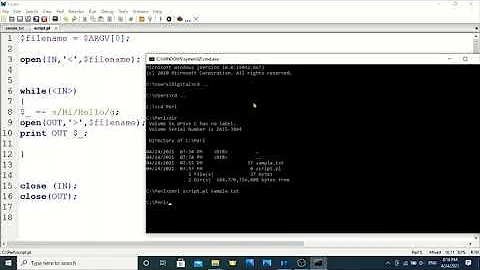Bash: Find and replace text strings
Solution 1
You don't need grep at all:
sed -i 's/ /\ /g' /path/to/test
This will escape all spaces in the file. To escape only on some strings, see Guru's answer.
Now, if you want to do that on all files which contain a space character in a given directory:
grep -rl ' ' /path/to/test/dir | xargs sed -i 's/ /\ /g'
which is, now I realize, identical to your command line, except the char after -r, which should be a lowercase L.
(Note: I'm assuming GNU tools are being used.)
Solution 2
One way:
sed -i 's/Alfred Hitchcock/Alfred\\ Hitchcock/' /path/to/test
Solution 3
Try executing the grep command by itself to see what's happening.
It will print something like
/path/to/test/test:Alfred Hitchcock
When piping this to xargs, it will attempt to execute
sed -i 's/ /\ /g' /path/to/test/test:Alfred
sed -i 's/ /\ /g' Hitchcock
Related videos on Youtube
Conor Taylor
Updated on September 18, 2022Comments
-
Conor Taylor over 1 year
I figured this would be easy, but I'm overlooking something simple:
I have a text file called
test. It contains, for example, the stringAlfred Hitchcock. I want to replace this withAlfred\ Hitchcock.I figured this would do it:
grep -r1 ' ' /path/to/test | xargs sed -i 's/ /\ /g'But it tells me:
sed: can't read Alfred: No such file or directory sed: can't read Hitchcock: No such file or directoryNot quite sure what's going on. Any help would be great, thanks.
-
 Dennis over 11 yearsIt's not quite clear what you're trying to achieve with the grep command. Do you want to replace spaces in all files inside a directory?
Dennis over 11 yearsIt's not quite clear what you're trying to achieve with the grep command. Do you want to replace spaces in all files inside a directory?
-
-
vonbrand over 11 yearsI'm nost sure if all
sed(1)handle-i; use a temporary file if your's doesn't:sed 's/ /\\ /g' /path/to/test > tmpfile; mv tmpfile /path/to/test -
 Aluísio A. S. G. over 11 yearsSince grep's
Aluísio A. S. G. over 11 yearsSince grep's-rflag is being used in the OP, I believe GNU tools are being used. But that's a good point. -
nerdwaller over 11 yearsIf you're new to sed and you use
-iI would suggest doing-i.origor something distinguishable, it makes a copy first (just in case you make a mistake in the sed command!)




